| Srl | Item |
| 1 |
ID:
134899
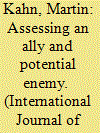

|
|
|
|
|
| Summary/Abstract |
When the Soviet Union and the United States became potential enemies at the end of World War II increased U.S. resources were spent on trying to better understand the USSR's economy and society. As the Cold War escalated in the immediate post-war years new U.S. organizations were created to analyze the USSR. Studies have been conducted about U.S. government assessments of the USSR during the Cold War, for example regarding the Central Intelligence Agency's (CIA) estimates of Soviet capabilities and intentions. 1 But the United States had already been trying to assess Soviet capabilities before the onset of the Cold War, and these efforts were of particular interest during World War II, when Soviet resources were being used against a common enemy: the Axis Powers.
|
|
|
|
|
|
|
|
|
|
|
|
|
|
|
|
| 2 |
ID:
132249
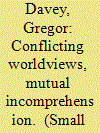

|
|
|
|
|
| Publication |
2014.
|
| Summary/Abstract |
Writing on British intelligence has tended to concentrate on the collection machinery in specific local contexts, the development of the Joint Intelligence Committee and the use of intelligence product by government. The emphasis has been on the optimisation of the intelligence bureaucracy in the face of Colonial Office intransigence. What this analysis largely leaves out, however, is a description of the culture and practices of the Colonial Office as it attempted to work with various colonial governments. Instead there is a tendency to overemphasise the rational nature of the bureaucratic changes in Whitehall and the contribution of MI5 and MI6 in the maintenance of security in the colonies. This article seeks to address these oversights by examining the divisions between the Colonial Office and the rest of the Whitehall intelligence machinery and show how counter-subversion remained a challenge to administrators both before and after the emergence of the Joint Intelligence Committee system.
|
|
|
|
|
|
|
|
|
|
|
|
|
|
|
|
| 3 |
ID:
124173
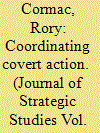

|
|
|
|
|
| Publication |
2013.
|
| Summary/Abstract |
Focusing on British involvement in the 1960s Yemen Civil War, this article examines the centralised mechanisms developed in Whitehall to coordinate covert action interdepartmentally. It therefore sheds new light on London's security and intelligence machine and its input into clandestine operations. Drawing on recently declassified documents and interviews, it uncovers various important but secretive actors, which have been overlooked or misunderstood in the existing literature, and outlines their functions in the most detail yet available. In doing so, it considers how these bodies evolved in relation to competing threat assessments of the local situation and the impact they had on Britain's covert intervention in the theatre. This article assesses the utility of the system and argues that it provided an effective means to ensure that any covert action sanctioned was properly scrutinised so as to reduce risks and best meet national interests.
|
|
|
|
|
|
|
|
|
|
|
|
|
|
|
|
| 4 |
ID:
153159
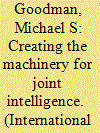

|
|
|
|
|
| Summary/Abstract |
On Tuesday 7 July 1936, a few weeks before the spectacular opening by Adolf Hitler of the Berlin Olympics, seven men sat around a large ornate table in a four-story building just opposite the entrance to Downing Street to discuss what was known of the growing military challenge that Germany posed for the British Empire. Six of the men were officers representing the intelligence staffs of the Royal Navy, Army, and Royal Air Force (RAF). The seventh was a shadowy civilian whose background was in an organization that had then no official existence, the Secret Intelligence Service (SIS). The building in which the meeting was taking place, No. 2 Whitehall Gardens, had previously made history when an earlier occupant, Benjamin Disraeli, had held meetings of his Cabinet there.
|
|
|
|
|
|
|
|
|
|
|
|
|
|
|
|
| 5 |
ID:
149468
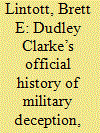

|
|
|
|
|
| Summary/Abstract |
This article analyses an episode in the development of intelligence official history in Britain. While an official history of intelligence in the Second World War was not approved until the 1970s, the idea had been pursued seriously in 1945 by Brigadier Dudley Clarke. Clarke had been the chief of deception operations in the Mediterranean theatre, and wanted to develop an official history and film recounting some of the exploits of his unit. This article argues that Clarke’s proposals, which were ultimately rejected by the Joint Intelligence Committee and the Chiefs of Staff, showed a prescient understanding of the power of official history, recognized that complete secrecy would be counter-productive, and are thus an important early milestone in the evolution of intelligence official history.
|
|
|
|
|
|
|
|
|
|
|
|
|
|
|
|
| 6 |
ID:
092459
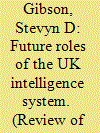

|
|
|
|
|
| Publication |
2009.
|
| Summary/Abstract |
The UK intelligence system is engaged in three distinct roles - producing strategic assessments in the traditional way; acting as a 'global policeman' by monitoring terrorist and criminal networks; and raising the capability of other countries to defeat terrorist and insurgency groups. Counter-intuitively, it is perhaps the first role that is most questionable. The use of single source intelligence reporting, drawn from individuals selected principally for their willingness to share secrets, may not be the best way to analyse emerging issues such as climate change, energy security and financial stability. The Joint Intelligence Committee (JIC) may be drawing on too narrow a range of reporting to compete with increasingly sophisticated assessments from the private sector, academia and NGOs. In any event, the JIC has less impact on policy than is often imagined. The second task of 'global networker' is better-suited to the intelligence community's ability to combine human intelligence with communications intelligence and bulk data gathering, and is producing results. The third task of helping other countries to enforce the law and resist insurgency is proceeding on an ad hoc basis with occasional successes, but requires co-ordination across Whitehall so that improvements in the capabilities of other countries' intelligence services are accompanied by improved police and justice systems and enhanced oversight. Joint Intelligence Committee perhaps ought to be a Joint Action Committee.
|
|
|
|
|
|
|
|
|
|
|
|
|
|
|
|
| 7 |
ID:
053651
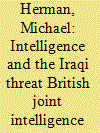

|
|
|
| 8 |
ID:
080713
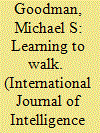

|
|
|
| 9 |
ID:
084064
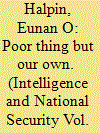

|
|
|
|
|
| Publication |
2008.
|
| Summary/Abstract |
This article explores the role of the Joint Intelligence Committee (JIC) in assessing the development of the Northern Ireland crisis from the mid-1960s until the imposition of direct rule in 1972. It argues that the JIC's very limited engagement with Northern Ireland prior to 1969 contributed significantly to Whitehall's failure to grasp the drift of affairs from the autumn of 1968 onwards. This was due to the JIC's preoccupation with Cold War issues, compounded by reluctance to interfere in the security affairs of the Northern Ireland government. When Northern Ireland became a stock item of JIC business in 1970, the JIC secretariat became heavily involved in efforts to improve the intelligence system in Northern Ireland. The article also raises the question of the JIC's role in establishing the parameters for intelligence and security operations concerning Northern Ireland, including the controversial 'Five Techniques' of interrogation, the introduction of internment in 1971, and covert activities in the Republic of Ireland. The article draws mainly on JIC, Prime Minister's Office and Foreign Office records in the National Archives.
|
|
|
|
|
|
|
|
|
|
|
|
|
|
|
|
| 10 |
ID:
059935
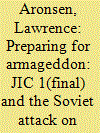

|
|
|
| 11 |
ID:
130815
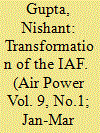

|
|
|